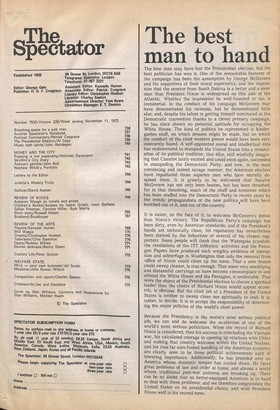The best man to hand
The best man may have lost the Presidential election, but the best politician has won it. One of the remarkable features of the campaign has been the assumption by George McGovern and his supporters of their moral superiority, and the impression that the senator from South Dakota is a better and a nicer man than President Nixon is widespread on this side of the Atlantic. Whether the impression be well-founded or not is immaterial. In the conduct of his campaign McGovern may have demonstrated hi's niceness, but he demonstrated little else; and, despite his talent in getting himself nominated at the Democratic convention thanks to a clever primary campaign, he has since shown no potential aptitude for occupying the White House. The kind of politics he represented is kindergarten stuff, on which dreams might be made, but on which the conduct of the chief western power would have been very insecurely based. A self-appointed moral and intellectual elite has endeavoured to stampede the United States into a renunciation of its political tradition; that elite, still wistfully imagining that Camelot lately existed and could exist again, succeeded in stampeding the Democratic Party; and now, in the most convincing and indeed savage manner, the' American electors have repudiated those superior men who have secretly despised them. It is greatly to be welcomed that Senator McGovern has not only been beaten, but has been thrashed; for in that thrashing, much of the chaff and nonsense which has been stuffed into the Democratic Party in recent years by the trendy propagandists of the new politics will have been knocked out of it, and out of the country.
It is easier, on the face of it, to welcome McGovern's defeat than Nixon's victory. The Republican Party's campaign has been dirty, even by American standards; and if the President's hands are technically clean, his reputation has nevertheless been stained by the behaviour of several of his closest supporters. Some people will think that the Watergate scandals, the revelations of the ITT lobbyists' activities and the Pentagon Papers have produced such weighty evidence of corruption and subterfuge in Washington that only the removal from office of Nixon could clean up the mess. That a new broom could sweep cleaner, is true enough. That some very unedifying and distasteful carryings on have become commonplace in and around the White House and the Pentagon, is undeniable. That were the object of the Presidential election to choose a spiritual leader then the choice of Richard Nixon would appear eccentric, is obvious. But the chief job of a President of the United States is neither to sweep clean nor spiritually to lead. It is, rather, to decide. It is to accept the responsibility of determining the major policies of the world's chief power.
Because the Presidency is the world's most serious political job, we can and do welcome the re-election •of one of the world's most serious politicians. When the record of Richard Nixon is considered, then his success in concluding the Vietnam war, his calculated courage in, opening up relations with China and making that country welcome within the United Nations, and his thus far sure-footed handling of the American economy are clearly seen to be three political achievements each of towering importance. Additionally, he has presided over an America whose domestic temper has cooled down. He faces great problems of law and order at home, and abroad a world whose traditional post-war patterns are breaking up. There can be no doubt that no better-equipped American is to hand to deal with these problems; and we therefore congratulate the United States on its presidential choice, and wish President Nixon well in his second term.


















































 Previous page
Previous page